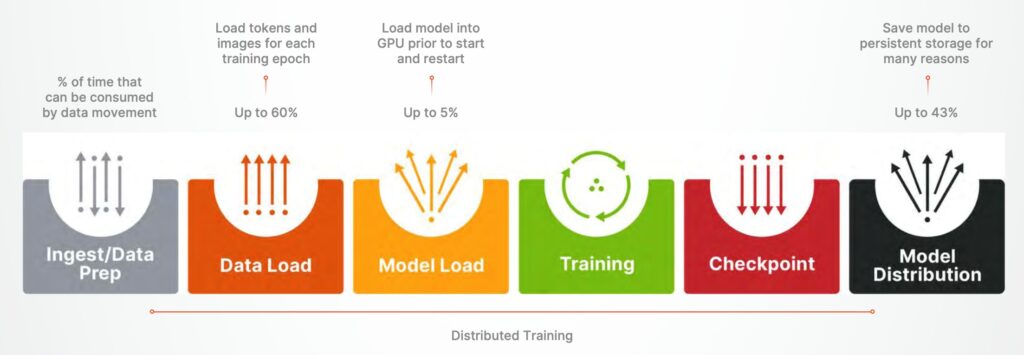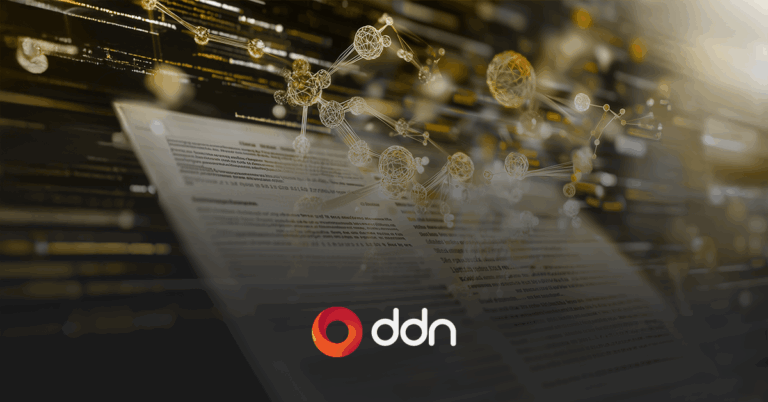Executive Summary: Scaling AI in Life Sciences with Trusted Data
AI is rapidly transforming life sciences from accelerating drug discovery to improving diagnostics and personalizing care.
But while the pace of AI research is advancing, most organizations still face major challenges when it comes to operationalizing that innovation at scale.
The root issue isnʼt algorithmic complexity or compute capacity. Itʼs data.
Fragmented datasets, slow pipelines, and escalating privacy requirements often hold back even the most ambitious AI initiatives. According to the 2025 NVIDIA State of AI in Healthcare and life sciences report, data privacy and sovereignty ranked as the top barrier to AI deployment for large organizations, while smaller firms pointed to limited budgets and insufficient data volumes.
To realize the full potential of AI, life sciences organizations need more than infrastructure, they need intelligent, secure, and scalable data platforms that empower AI teams to move faster without compromising trust like DDNʼs Data Intelligence Platform.
AI in Life Sciences: Promise and Pressure
Life sciences is in the midst of a generational shift. AI is helping to uncover new therapeutic pathways, speed time-to-treatment, and improve diagnostic accuracy. The numbers are telling:
- 63% of life sciences organizations are already actively using AI, with another 31% piloting or assessing its use.
- 81% of those using AI have already seen revenue growth as a direct result of their deployments.
- 41% say AI has accelerated R&D, and 35% report enhanced diagnostic precision and clinical insight
And the future looks even more promising. 83% of respondents believe AI will revolutionize healthcare and life sciences within the next 3–5 years.
Yet despite these results, many organizations still arenʼt fully confident in their ability to scale. Only 32% believe their AI investments are sufficient to support their goals, and the top barriers cited include data privacy, model training bottlenecks, and siloed infrastructure.
The Data Bottleneck Behind Healthcare Breakthroughs
The core challenge isnʼt a lack of AI ambition, itʼs the inability to move data fast enough, securely enough, and at the scale AI demands.
- Data Complexity
Life sciences data is inherently multi-modal: from genomics and real-world evidence to high-resolution imaging and unstructured clinical notes. Yet these datasets often live in isolated, incompatible systems. - Latency and Inefficiency
Slow pipelines stall AI model training, delay insights, and waste GPU resources. Without real-time data delivery, researchers can’t fully leverage Generative AI or LLMs to iterate quickly or test hypotheses in production. - Security and Compliance
Sensitive clinical and research data must be handled in accordance with HIPAA, GDPR, and increasingly stringent global regulations. Without strong governance, every AI workflow becomes a potential liability. - Cost
Multiple AI use cases mean larger training sets, longer retention periods, and more performance requirements. The result? Higher costs, especially for small and mid-sized research teams.
Why AI Training Requires High-Performance Data Storage

What AI-Driven Life Sciences Really Needs from Data Platforms
From our deep engagement with leading research hospitals, biotech innovators, and genomics labs, five needs have emerged as universal:
- Unified Data Access
Consolidating genomics, imaging, clinical trial, and other data into a secure, accessible environment. - Low-Latency Performance
Feeding GPUs and AI pipelines at speeds that match modern AI model requirements, especially for LLMs and Generative AI. - Security and Governance by Design
Including real-time encryption, credential-based access, and automated compliance reporting. - Seamless Scalability
Supporting workloads that grow from terabytes to exabytes, without disruption or re-engineering. - Operational Simplicity
Reducing manual integration, enabling plug-and-play AI architectures, and eliminating redundant infrastructure.
The 5 Pillars of Scalable, Secure AI Data Intelligence
DDNʼs Data Intelligence Platform delivers the core capabilities required to drive real-time decisioning, streamline AI workflows, and enable continuous innovation – no matter the size or complexity of your data.
- Unified AI-Ready Data
Bring together imaging, omics, clinical records, and real-world evidence into a single data lake – no refactoring needed. - Real-Time, High-Speed Data Access
Feed GPU workloads with sub-millisecond latency and multi-TB/s throughput to maximize model efficiency and inference speed. - Built-In Security & Auditability
Comprehensive encryption, zero-trust access controls, and automated audit logs ensure compliance with HIPAA, GDPR, and GxP. - Scalable from Terabytes to Exabytes
Whether starting with one modality or managing data from a global clinical trial network, DDN scales seamlessly. - Optimized for AI Training & Inference
Up to 30% faster model training and 15x faster checkpointing accelerate pipeline performance and model iteration.
DDN in Action: AI Infrastructure That Delivers Measurable Outcomes
| Before DDN | With DDN |
| Slow research cycles | Accelerate discovery – Speed up pipelines and diagnostics |
| Regulatory complexity | Stay compliant – Without slowing AI development |
| Slow to scale AI initiatives | Future-ready – Adapt to exponential data and new AI use cases |
| High infrastructure costs | Cut storage costs – Up to 10x lower TCO |
| Underutilized GPUs | Maximize GPU ROI – Run at full bandwidth with no idle time |
| Siloed, manual workflows | Simplify operations – Eliminate silos and reduce integration |
Use Cases on the Frontlines of AI in Life Sciences
Drug Discovery & Development
Pharma organizations cite drug discovery as the #1 AI use case (59%). With generative models and simulation data exploding in size, high-throughput access is critical.
DDN Advantage: Deliver real-time data to GPU clusters, accelerate compound screening, and reduce training times for generative AI by up to 10x.
Imaging-Driven Diagnostics
In medtech, 71% cite imaging and diagnostics as their top AI focus. That means feeding AI models with enormous volumes of CT, MRI, and pathology images.
DDN Advantage: Sub-millisecond latency supports real-time inference, enabling faster diagnoses and AI-augmented precision.
Genomics & Multi-Modal Research
AI depends on harmonizing disparate datasets. But research teams are still managing genomics, trial, and patient data in separate silos.
DDN Advantage: Unified, AI-native data environments simplify orchestration and speed hypothesis testing across datasets.
Clinical Documentation & Natural Language Processing
55% of organizations use AI to generate clinical notes. These NLP models depend on fast, secure access to structured and unstructured text.
DDN Advantage: Supports seamless LLM training at scale, with data governance features baked in for safe EHR usage.
Final Thoughts: AI Infrastructure at the Speed of Science
AI is not the future of Life Sciences; itʼs the engine powering its most transformative breakthroughs. But without the right data platform, even the best models will fall short.
The industry is clear: 86% of professionals believe AI is essential to their organizationʼs future. Whatʼs less clear is how to deploy it safely, at scale and without compromise.
Thatʼs where DDN comes in. We donʼt just deliver performance, we deliver confidence. Confidence that your data is accessible, protected, and optimized for every AI use case you take on. If your goal is to accelerate time-to-treatment, reduce the cost of discovery, and unlock life-changing insights faster, itʼs time to move past the limitations of legacy systems.
AI infrastructure enables faster drug discovery, diagnostic precision, and compliance at scale by delivering real-time, AI-ready data across diverse modalities.
DDN accelerates compound screening and model training with low-latency data delivery, enabling up to 10x faster throughput for generative AI workflows.
DDN provides built-in encryption, zero-trust access controls, and compliance reporting for HIPAA, GDPR, and GxP, ensuring trust in clinical AI deployments.
DDNʼs AI Data Intelligence Platform reduces total cost of ownership by up to 10x while scaling from terabytes to exabytes with no disruption.
AI data storage is optimized for real-time pipelines, inference, and model training – eliminating silos and delivering sub-millisecond latency at massive scale.
